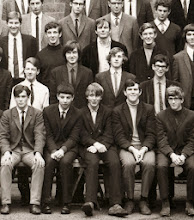
This is going to be quite a long section of the bibliography because one of the themes of True North is the lasting tradition of enterprise. With it, in many more cases than is generally recognised, went (and still goes) high principles. Businesses were not just set up to build brass castles for their owners; they provided work, opportunity for advancement for all involved and self-respect.
Enough moralising. But here's a very high moral tome to start with; A Quaker Business Man by Anne Vernon, William Sessions 1982. This is a life of Joseph Rowntree, whose modest grave at The Retreat is indistinguishable from those of all the other York Quakers whose remains lie beside his. If you visit, note how long these virtuous people generally lived! my copy has an interesting press release from the Joseph Rowntree Foundation (another of the three great Rowntree trusts) tucked inside, all about New Earswick model village which the great man funded. The Joseph Rowntree Inheritance published by the three great trusts in 2004 is also the sort of thing to cheer you up in glum times.

Completely different is Talking Spanish, a Yorkshire Arts Circus study (1992) of one of the north's most interesting ways of making a living. Like most Arts Circus books, it has the serious flaw of not attributing the quotes and reminiscences about working in the liquorice industry in Pontefract.
 But it's full of marvellous detail, social as well as commercial, and I like this girl in a liquorice outfit so much that I've made her bigger than any photograph in the blog so far. Another good book, by mates of the Arts Circus Richard Van Riel and Briony Hudson, is Liquorice, published by Wakefield district council to go with an exhibition in the early 200s. (It's undated, alas).
But it's full of marvellous detail, social as well as commercial, and I like this girl in a liquorice outfit so much that I've made her bigger than any photograph in the blog so far. Another good book, by mates of the Arts Circus Richard Van Riel and Briony Hudson, is Liquorice, published by Wakefield district council to go with an exhibition in the early 200s. (It's undated, alas).Two good books on the canal trade which was very important to the growth of the industrial North are Victor Waddington, Giant of the South Yorkshire Waterways, by Mike Taylor, Yorkshire Waterways Publications 1999, and Pennine Pioneer by Keith Gibson, Tempus 2004. The first tells a story which is still very much alive in business terms; the canals leading in from the Humber and Trent continue to be of great economic significance. So is the revived Rochdale canal, the subject of the second book, although its role today is tourism rather than commerce.
The Hainsworth Story by Ruth Strong, Jeremy Mills Publishing 2006, describes how a traditional textile company has managed to survive, nay flourish, into the 21st century. I make use of this as an exemplar of the type, in the book. Billingham in Times Past by Paul Menzies, Countryside, two vols 1985 and 1986, has some invaluable material on the early days of ICI and the trouble the company took to provide model housing for its workforce. The History of North East Shipbuilding by David Dougan, Allen & Unwin, 1968, describes a magnificent tradition dating back to Daniel Defoe's time. In 1727 he observed, accurately, of Newcastle upon Tyne: "...they build ships here to perfection." Tyne and Tide by David Archer, Daryan Press 2003, has plenty more. H W Schneider of Barrow and Bowness by A G Banks, Titus Wilson (Kendal) 1984, is enjoyable on both Barrow shipyards and Windermere steam yachts I'll be adding plenty more to this section of the blog, too, over the next few weeks.
And here they come: Made in Huddersfield by Jack Ramsay, North of Watford Publishing 1989, is an eloquent lament for what was, albeit with too many grainy and gloomy pics. The magnificent story of the Fielden manufacturing dynasty of Todmorden, classic Northern industrialists who were also very radical and religious (the latter in the best, social conscience, sense), is told in Fieldens of Todmorden by Brian Law, George Kelsall 1995, and A History of Todmorden by Malcolm and Freda Heywood and Bernard Jennings, Smith Settle 1996. Both are socking great tomes. The noble pair of Marie Hartley and Joan Ingilby have famously covered many Northern subjects; but the general association of them with the Yorkshire Dales is too narrow. Books such as Life and Tradition in West Yorkshire, Dent 1976, Smith Settle 1990, are full of firsthand accounts from the factories and mills, which give a much broader picture than the usual cliche. Scotswood Road by Jimmy Forsyth, Bloodaxe Books 1986, is engaging on Newcastle upon Tyne's industry and those who worked in it. Marshalls of Leeds, flax-spinners by M M Postan (Cambridge University Press) is an excellent study of a fascinating firm - the one which gave us the Egyptian Temple Mills in Holbeck, Leeds.To Prove I'm not Forgot by Sylvia Barnard, Manchester University Press 1990, is a great look at manufacturing from the unusual angle of the dead. It's a cracking history of the huge graveyard opposite St James's hospital in Leeds where both mighty manufacturers, such as Sir John Barran, and their workers at last rest.

No comments:
Post a Comment